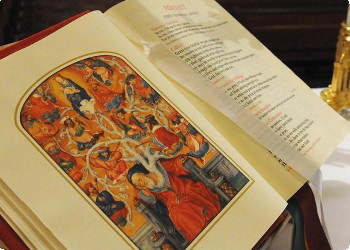Blessed are those who have not seen and have believed
3 JULY (Jn 20,24-29)
When Jesus revealed his messianic truth to the people of Nazareth, these refused to believe. Then it was one against one hundred. Jesus spoke from his truth. All the others refused him, not believing in his words. He was not the Messiah.
Rolling up the scroll, he handed it back to the attendant and sat down, and the eyes of all in the synagogue looked intently at him. He said to them, “Today this scripture passage is fulfilled in your hearing.” And all spoke highly of him and were amazed at the gracious words that came from his mouth. They also asked, “Isn’t this the son of Joseph?” He said to them, “Surely you will quote me this proverb, ‘Physician, cure yourself,’ and say, ‘Do here in your native place the things that we heard were done in Capernaum.'” And he said, “Amen, I say to you, no prophet is accepted in his own native place. Indeed, I tell you, there were many widows in Israel in the days of Elijah when the sky was closed for three and a half years and a severe famine spread over the entire land. It was to none of these that Elijah was sent, but only to a widow in Zarephath in the land of Sidon. Again, there were many lepers in Israel during the time of Elisha the prophet; yet not one of them was cleansed, but only Naaman the Syrian.” When the people in the synagogue heard this, they were all filled with fury. They rose up, drove him out of the town, and led him to the brow of the hill on which their town had been built, to hurl him down headlong. But he passed through the midst of them and went away (Lk 4,20-30).
The beginnings of the faith are difficult for everyone. Even for the disciples of Jesus the beginnings of their preaching are difficult. Jesus is risen. He appears to the Eleven. Thomas is not with them. They tell what they have seen and heard, but he does not listen to reason. He will believe only after having touched and seen, seen and touched. If he does not see the risen with his own eyes and does not touch him with his hands, he will not believe. These are his terms.
Today, the apostles gain the first to experience of how hard it is to preach the Gospel and to proclaim Christ. There are ten witnesses of the resurrection of Jesus for visual and auditory contact, they all agree. There is no dissenting voice that can act as a temptation to Thomas. Yet he does not believe. And they are his friends, brothers, comrades, “colleagues”, all Apostles of the Lord. If in the process of faith one does not trust a brother, who might he trust. Now the apostles know what awaits them in the world.
Thomas, called Didymus, one of the Twelve, was not with them when Jesus came. So the other disciples said to him, “We have seen the Lord.” But he said to them, “Unless I see the mark of the nails in his hands and put my finger into the nail marks and put my hand into his side, I will not believe.” Now a week later his disciples were again inside and Thomas was with them. Jesus came, although the doors were locked, and stood in their midst and said, “Peace be with you.” Then he said to Thomas, “Put your finger here and see my hands, and bring your hand and put it into my side, and do not be unbelieving, but believe.” Thomas answered and said to him, “My Lord and my God!” Jesus said to him, “Have you come to believe because you have seen me? Blessed are those who have not seen and have believed.”
The experience of the Apostles with Thomas must teach us a great truth. Faith is not a human process. One does not believe out of friendship and not even because he walks together making the same journey, following Christ Jesus. The faith is a most pure gift of the Holy Spirit. It is a current gift. Today for today, tomorrow for tomorrow, always for always. There are no human relationships in the process of faith. These must be abolished.
One does not believe for friendship, for fellowship, for kinship, for closeness and belonging. He believes by a pure gift of the Holy Spirit. The work of the Spirit is always to be asked, always to be invoked, always to be begged. Today, the Apostles have to be convinced that it will not be their testimony to lead the world into the faith. It will be their witness and the power of the Holy Spirit that must always interneve in their mission. We study new strategies, thinking that they are the way of faith. The strategies belong to our humanity. To strategies it is urgent to always add the Spirit of the Lord. We and He, H and we, always, without interruption.
Virgin Mary, Mother of the Redemption, Angels and Saints give us this most pure faith.





